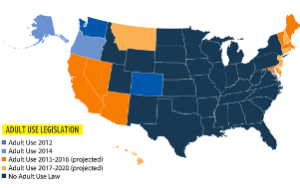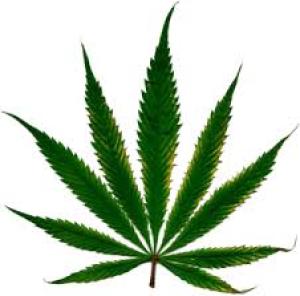Four states and DC have already legalized. Here's the next batch.
The home of Rastafari and Bob Marley is finally going to decriminalize marijuana possession.
Medical marijuana is seeing lots of action at state houses around the country, and the American Academy of Pediatrics has a new policy statement supporting medical marijuana.
NYPD narcs gone bad, a Utah drug task force agent gets busted, and a Colorado cop heads to federal prison.
There's medical marijuana action in the states, the Supreme Court hears a case about drug dogs, Jamaica is about to decriminalize ganja, an asset forfeiture reform bill is moving in Virginia, and more.
Marijuana-related activity is ratcheting up at statehouses across the land, Massachusetts' governor rejects legalization, and the CDC issues a warning on opiate pain reliever use among women of childbearing age.
Some pleasantly surprising poll results from Michigan, medical marijuana bills are popping up all over the place, the Baby Bou Bou SWAT raid is sparking bills to rein in over-the-top drug raiders, and more.
A marijuana business groups predicts 18 states will legalize by 2020, medical marijuana bills get filed in Florida and Pennsylvania, the DEA is tracking your license plates, federal asset forfeiture reform and hemp bills are filed, and more.
The House Speaker doesn't appear too interested in undoing legalization in DC, Nebraska's AG explains his lawsuit against Colorado legalization, good poll results from Virginia, more pressure for federal asset forfeiture reform, and more.
Written in partnership with Alternet and originally published here.

President Obama is taking a pretty much laissez-faire approach to legalization experiments in the states. (whitehouse.gov
"What you're seeing now is Colorado, Washington through state referenda, they're experimenting with legal marijuana," the president said in response to a question from YouTube host Hank Green. "The position of my administration has been that we still have federal laws that classify marijuana as an illegal substance, but we're not going to spend a lot of resources trying to turn back decisions that have been made at the state level on this issue. My suspicion is that you're gonna see other states start looking at this."
Indeed. Legalization bills are already popping up in state legislatures around the country, and while it's unlikely -- though not impossible -- that any of them will pass this year, 2016 looks to be the breakout year for freeing the weed. One state is going to be the first to legalize it through the legislature, and next year seems reasonable. And the presidential election year is also likely to see successful legalization initiatives in several more.
Currently four states -- Alaska, Colorado, Oregon, and Washington -- and the District of Columbia have ended pot prohibition. But that's only about 18 million people. By the time they quit counting the votes on Election Day 2016, that number is likely to triple, and then some.
So, where's it going to happen? Here's where:
California
That California is the only state on the West Coast to not yet have legalized pot is an embarrassment to Golden State activists. They were first with medical marijuana in 1996, and they tried to be first to legalize it with Prop 19 in 2010, but came up short, garnering 46% of the vote on Election Day despite leading in the polls up until the final weeks. In 2012, with the big players sitting on their cash stashes, none of the competing initiative efforts even managed to make the ballot.
It will be different in 2016. The actors with deep pockets are all ready to get involved next year, the polling is good (if not great, hovering in the mid-50s), and the state's disparate and fractious cannabis community is already working to forge a unified front behind a community-vetted initiative. The main vehicle for activists is the California Coalition for Cannabis Law Reform, which has already started holding meetings statewide to try to a unified marijuana reform community.

California activists are laying the groundwork for 2016. (cannabispolicyreform.org)
With 38 million people, California is the big prize. It's also an expensive place to run an initiative, with the cost of getting on the ballot alone at around a million dollars. And it'll take several million more to pay for advertising in the key final weeks of the campaign. But the money is lining up, it'll take fewer signatures to qualify for the ballot (thanks to the dismal turnout in last year's midterms), and once it qualifies, it will have momentum from (by then) four years of legalization in Colorado and Washington and two years of it in Alaska and Oregon. California will go green in 2016.
Nevada
Nevada is the state that is actually furthest down the path towards legalizing it next year. The Marijuana Policy Project-backed Coalition to Regulate Marijuana Like Alcohol in Nevada has already qualified a legalization initiative for the 2016 ballot. It would legalize the possession of up to an ounce by adults 21 and over and allow for taxed and regulated marijuana commerce.
Under Nevada law, the legislature now has a chance to approve the initiative. If it does so, it would become law; if it rejects it or fails to act on it, it then goes to the voters on Election Day 2016.
Nevadans approved medical marijuana in 1998 (59%) and again in 2000 (65%), but voted down decriminalization in 2002 (39%) and legalization in 2006 (44%). But it has since then effectively decriminalized possession of less than ounce, and it's now been a decade since that last legalization initiative loss at the polls. Either marijuana will be legal by Election Day 2016 thanks to the legislature or the voters will decide the question themselves at the polls.
Arizona
In Arizona, possession of any amount of pot is still a felony, but polling in the last couple of years shows support for legalization either hovering around 50% or above it. Those aren't the most encouraging polling numbers -- the conventional wisdom is that initiatives want to start out at 60% support or better -- but a serious effort is underway there to put the issue before the voters in 2016.
The Marijuana Policy Project (MPP) is teaming with Safer Arizona and other state activist groups for the 2016 initiative campaign and has formed a ballot committee to begin laying the groundwork for a Colorado-style initiative.
The initiative language is not a done deal, and there are some signs that local activists aren't completely happy with MPP's proposed language, but that's why there are consultations going on.
Maine
The Marijuana Policy Project has been laying the groundwork for a statewide legalization initiative in 2016 with local initiative campaigns in some of the state's largest cities in 2014 and 2013 and is working on final initiative language now. But it is also seeing competition from a state-based group,Legalize Maine, that says it is crafting its own initiative and is criticizing both MPP and Maine politicians for advancing "out of state corporate interests" at the expense of Mainers.
Whether MPP and Legalize Maine can get together behind a single initiative remains to be seen. If they can, good; if they can't, well, Maine is a small and relatively inexpensive state in which to run a signature-gathering campaign. There could be not one, but two legalization initiatives in Maine next year.
Meanwhile, state Rep. Diane Russell has filed a legalization bill in the legislature this year. Maine is one of the states where the looming presence of legalization initiatives could actually move the legislature to act preemptively to craft a legalization scheme to its own liking.
Massachusetts
Massachusetts is another. As in Maine, but to a much greater degree, Bay State activists have been laying the groundwork for legalization for years. Groups such as MassCann/NORML and the Drug Policy Forum of Massachusetts have run a series of marijuana reform "public policy questions" in various state electoral districts each election cycle since 2000 -- and they have never lost! The questions are non-binding, but they're a clear indicator to state legislators where voter sentiment lies.
The state has also seen successful decriminalization and medical marijuana initiatives, in 2008 and 2012, respectively. In both cases, the initiatives were approved with 63% of the vote. And again as in Maine, the Marijuana Policy Project is organizing an initiative, but local activists with similar complaints to those in Maine are threatening to run their own initiative. Organized as Bay State Repeal, which includes some veteran Massachusetts activists, the group says it wants the least restrictive legalization law possible. Whether the two efforts can reach a common understanding remains to be seen.

Show Me Cannabis may pull off a surprise in Missouri.
Meanwhile, the issue could move in the legislature in the next two years. New Republican Gov. Charlie Baker says he's opposed to legalization, but is praising Democratic Senate President Stanley Rosenberg's decision to appoint a special Senate committee to examine issues around legalization. Rep. David Rogers (D-Cambridge) isn't waiting. He's filed a legalization bill, and while previous such bills have languished in the Joint Committee on the Judiciary, incoming committee head Sen. Will Brownberger (D-Boston) has said he will give it a hearing. Something could happen this year, although it's more likely next year, and the voters doing it themselves on Election Day 2016 is more likely yet.
Vermont
Vermont could be the best bet for a state to legalize it this year and for the first state to legalize it through the legislative process. There is no initiative process in the state, so that's the only way it's going to happen. And the state has already proceeded well down that path.
Gov. Peter Shumlin (D) has endorsed legalization in principle -- the devil is the details -- and the legislature last year approved a RAND study on the impacts of legalization, which was just released earlier this month. That study estimated that freeing the weed could bring the state $20 to $70 million in annual pot tax revenues.
Other state officials have expressed openness to the idea, and a May 2014 poll found 57% support for legalization. There's not a bill in the hopper yet this year, but one could move quickly in this state where a lot of the legislative groundwork has already been laid.
The Marijuana Policy Project has formed the Vermont Coalition to Regulate Marijuana to help push the process along. Stay tuned; this is one to watch.
Missouri
And there's a dark horse in the heartland. The Missouri activist group Show Me Cannabis has been running an impressive educational campaign about marijuana legalization for the past few years. The group tried to get an initiative on the ballot last year, but came up short.
They've already filed paperwork for 2016 for a constitutional amendment to make it legal to grow, sell, and use marijuana for people 21 and over.
One reason Show Me Cannabis came up short in 2014 was the lack of support from major players outside the state. Given the lack of polls showing strong support for legalization, the big players remain sitting on their wallets, but that could change if good poll numbers emerge. And there's still plenty of time to make the 2016 ballot.
back to top
This article was published in collaboration with AlterNet.
The island nation most closely associated with marijuana is about to decriminalize it. The Jamaican cabinet Monday approved a bill that would do just that, as well as allow for the creation of medical marijuana and hemp industries.

Rastaman has a reason to smile. (wikimedia.org)
It would decriminalize the possession of up to two ounces of ganja; allow its use for religious, medical, scientific, and therapeutic purposes; prohibit smoking it in public places; and provide for the granting of licenses for the development of a legal hemp and medical marijuana industry.
While Jamaica is home to the Rastafarian religion, whose sacrament is marijuana, and has high usage rates (9.8% of the adult population, ranking it 10th worldwide, according to the UN), it has been slow to move forward on marijuana law reform.
It's been 14 years since a government-appointed National Commission on Ganja recommended decriminalization. At the time, Jamaican politicians were able to point to baleful threats coming from Washington as a reason not to move forward.
But things have changed. The United States is no longer wielding international drug control treaties as clubs with which to beat down reform efforts and, in fact, is moving unevenly toward marijuana legalization itself. Four states and the District of Columbia have already legalized it, and 14 more have decriminalized it.
The situation in the hemisphere is similar. Uruguay has already legalized it, while Argentina, Colombia, and Mexico have decriminalized the possession of small amounts. The land of the legendary Lamb's Bread pot strain and the home of ganja icon Bob Marley is in danger of being left behind when it comes to bringing marijuana laws into the 21st Century.
Groups such as the Ganja Law Reform Coalition, the Ganja Future Growers and Producers Association, and the Cannabis Commercial and Medicinal Research Task Force have been urging the government to loosen the island's pot laws not only for the sake of social justice, but also for fear that failure to act will hurt Jamaica's competitiveness in what is foreseen to be an emerging international legal marijuana market.
Now, while they're not getting full legalization, they are getting decriminalization and the opportunity to lay the groundwork for a legal marijuana industry.
"The development is long overdue and comes after years, and, in recent times, heavy pressure from what is now a diverse and broadening group of stakeholders on human rights, social, economic, scientific and medical grounds," cannabis taskforce director Delano Seiveright said in a statement.
For Justice Minister Michael Golding, it's less about social justice than economics. Marijuana law reform could boost the island's already significant tourist industry, he said.
"We need to position ourselves to take advantage of the significant economic opportunities offered by this emerging industry," Golding said.
back to top
Medical marijuana is seeing lots of action at state houses around the country, and the American Academy of Pediatrics has a new policy statement on medical marijuana.
NationalOn Monday, pediatricians called for rescheduling marijuana and said compassionate use for children is okay. In a new policy statement, the American Academy of Pediatrics is recommending that the DEA reschedule marijuana to ease research on it. The influential medical society is also proposing that medical marijuana be made available on a compassionate basis for children with serious illnesses who have not benefited from other medicines. Click the policy statement link for more detail.
Florida
On Monday, a full-blown medical marijuana bill was filed. State Sen. Jeff Brandes (R-St. Petersburg) has filed Senate Bill 258, which would regulate the cultivation, distribution, and use of medical marijuana in the state. The proposal larger mirrors that failed constitutional amendment that won 57% of the vote last year (it needed 60% to pass because it was a constitutional amendment). The state passed a medical marijuana bill last year, but it was limited to high-CBD cannabis oils. Brandes is chair of the Senate Transportation Committee and sits on the Criminal Justice Committee, too.
Georgia
On Monday, a CBD medical marijuana bill was filed. Rep. Allen Peake (R-Macon) filed House Bill 1, which would allow the use of CBD cannabis oil for qualifying patients. He had earlier considered a bill that would allow marijuana to be grown in-state, but he removed that language after objections from Gov. Nathan Deal (R). Peake said he hopes a deal can be struck that will allow for cannabis oil to be imported to the state.
Iowa
Last Friday, medical cannabis oil patient registration opened. The Department of Health has completed establishing a process to approve and generate medical cannabis oil registration cards. The legislature passed a bill last year allowing for such use. The relevant Health Department web page is here.
Kansas
Last Wednesday, Kansas parents got a Senate hearing on a medical marijuana bill. The Senate Public Health and Welfare Committee heard Wednesday from parents of chronically ill children were speaking in support of pending medical marijuana legislation, SB 9, introduced by Sen. David Haley (D-Kansas City). Click on the title link for hearing details.
Last Thursday, opponents got their chance. The Senate Public Health and Welfare Committee heard from opponents of pending medical marijuana legislation Thursday. Eric Voth, chairman of the Institute on Global Drug Policy, said marijuana is harmful and legalization measures would threaten public health, while a spokesman for the Kansas Association of Police Chiefs said medical marijuana has caused problems in states that have allowed it.
Illinois
On Monday, the new governor said he was no hurry to grant business licenses. Former Gov. Pat Quinn (D) left behind a list of companies poised to be granted medical marijuana business licenses, but incoming Gov. Bruce Rauner (R) is in no hurry. Now he wants to conduct "a thorough legal review of the process" used to choose licensees. Medical marijuana patients will have to continue to wait.
Maine
Last Friday, a bill to allow medical marijuana in hospitals was introduced. State Sen. Eric Brakey (R-Auburn) has filed LD 35, which would allow registered patients to use medical marijuana in hospitals. It does so by adding hospitals to list of eligible primary caregivers, the list of places where patients can store and use medical marijuana, and barring hospitals from prohibiting the use of smokeless marijuana by patients.
Nebraska
Last Wednesday, a full-blown medical marijuana bill was filed. State Sen. Tommy Garrett (D-Bellevue) has filed LB 643, a full-blown medical marijuana bill that allows patients or caregivers to grow up to 12 plants and possess up to six ounces, envisions a dispensary system, and allows the plant to be used for a specified list of diseases and conditions.
Pennsylvania
On Tuesday, a medical marijuana was reintroduced. State Sens. Daylin Leach (D-Montgomery) and Mike Folmer (R-Dauphin) have reintroduced a medical marijuana that died late in the last session. The new bill, Senate Bill 3, is almost identical to last year's Senate Bill 1182. It has a bipartisan batch of cosponsors -- 11 Republicans and 14 Democrats.
Also on Tuesday, there was a change of tune from the governor's mansion. Last year, then Gov. Tom Corbett (R) was a staunch foe of medical marijuana. But now, there's a new year, a new legislative session, and a new governor. This one, Democrat Tom Wolf, met with families of children suffering from diseases treatable by medical marijuana Tuesday and said he would support broad medical marijuana legislation.
South Carolina
Last Thursday, a medical marijuana bill was filed. State Rep. Todd Rutherford (D-Columbia) last week formally introduced a full-blown medical marijuana bill, H3140, that he had prefiled back in October. It would allow registered patients to use medical marijuana for "a debilitating medical condition," and patients or caregivers could possess up to six plants and two ounces of usable marijuana. It is now before the House Judiciary Committee.
Texas
Last Friday, identical CBD medical marijuana bills were filed. State Rep. Stephanie Klick (R-Ft. Worth) and Sen. Kevin Eltife (R-Tyler) today introduced identical bills that would allow children with epilepsy to be treated with low-THC, high-CBD cannabis oils. The House version is HB 892.
Wyoming
Last Thursday, a medical marijuana bill was killed in the House. The House Judiciary Committee killed a medical marijuana bill on a 5-4 vote. The bill was House Bill 78.
[For extensive information about the medical marijuana debate, presented in a neutral format, visit MedicalMarijuana.ProCon.org].
back to top
NYPD narcs gone bad, a Utah drug task force agent gets busted, and a Colorado cop heads to federal prison. Let's get to it:
In New York City, two NYPD narcotics officers are being investigated for allegedly assaulting a former Marine sergeant. The veteran, Omar Rendon, said in a lawsuit filed Monday that he was eating lunch and watching a movie on his phone while sitting in his vehicle when two plainclothes narcs rousted him, demanding he get out of his car. When he asked for their badges, they violently yanked him out of the car and punched him. He was then searched and handcuffed, but no charges were filed after nothing turned up.In Ogden, Utah, a former Weber-Morgan Narcotics Strike Force agent was arrested last Friday on charges he twice solicited a woman to hire a man to purchase oxycodone for him. Don Henry Johnson, 29, went down after he promised to pay the woman, but failed to come through. She then reported what happened to authorities. He is now charged with two counts of second-degree felony drug distribution, and is looking at up to 15 years on each count.
In Denver, a former Walsenburg police officer was sentenced last Friday to five years in federal prison for helping her husband's heroin distribution business. Gloria Suazo, 32, had been convicted of conspiracy to possess heroin with the intent to distribute. Her husband got 10 years.
back to top
There's medical marijuana action in the states, the Supreme Court hears a case about drug dogs, Jamaica is about to decriminalize ganja, an asset forfeiture reform bill is moving in Virginia, and more. Let's get to it:

South Dakota Highway Patrol drug dog and trainer. How long can you be detained waiting for them to show up? (dps.sd.gov)
Washington State "Comprehensive Marijuana Reform Act" Filed. State Sen. Jeanne Kohl-Welles (D-Seattle) is filing this week legislation designed to bring the state's existing medical and recreational marijuana systems into agreement. "The main intent of my bill is to simplify and unify the two systems so that complex gray areas and dangerous illicit markets will eventually cease to exist," she said. The bill would eliminate unregulated dispensaries and collective gardens, but it would also direct the state Liquor Control Board to increase the number of retail outlets by adopting a competitive, merit- and experience-based licensing application system.
Medical Marijuana
Kansas Parents Get Senate Hearing on Medical Marijuana Bill. The Senate Public Health and Welfare Committee heard Wednesday from parents of chronically ill children were speaking in support of pending medical marijuana legislation, SB 9, introduced by Sen. David Haley (D-Kansas City). Click on the title link for hearing details.
Maine Bill Would Allow Medical Marijuana in Hospitals. State Sen. Eric Brakey (R-Auburn) has filed LD 35, which would allow registered patients to use medical marijuana in hospitals. It does so by adding hospitals to list of eligible primary caregivers, the list of places where patients can store and use medical marijuana, and barring hospitals from prohibiting the use of smokeless marijuana by patients.
Nebraska Medical Marijuana Bill Filed. State Sen. Tommy Garrett (D-Bellevue) has filed LB 643, a full-blown medical marijuana bill that allows patients or caregivers to grow up to 12 plants and possess up to six ounces, envisions a dispensary system, and allows the plant to be used for a specified list of diseases and conditions.
Opiates
New Jersey Legislators Tackle Package of Heroin and Pain Pill Bills. State Sen. Joseph Vitale (D-Woodridge), chairman of the Senate Health, Human Services and Senior Citizens Committee, announced Wednesday that legislators from both parties had introduced a package of 21 bills aimed at confronting widespread heroin and prescription pill use. The bills are designed to increase access to treatment and recovery. Click on the link for more details.
Asset Forfeiture
Virginia House Panel Approves Bill Ending Civil Asset Forfeiture. A bill that would require a criminal conviction before asset forfeiture could take place has passed the Criminal Law Subcommittee of the House Committee for Courts of Justice. HB 1287, sponsored by Del. Mark Cole (R-Spotsylvania) now heads for a full committee vote.
Criminal Justice
Vera Institute for Justice DC Event Next Week Features Sen. Cory Booker. The Vera Institute is hosting "Justice in Focus: The Path Forward," in Washington, DC, next Tuesday. The event will feature a keynote interview with Sen. Cory Booker (D-NJ), as well as panels with other major figures in criminal justice reform. Click on either link for more information and event details.
Drug Testing
Wisconsin Governor Moving Forward With Public Benefits Drug Testing Scheme. Republican Gov. Scott Walker today announced more details of his plan to require drug screening and testing of people seeking public benefits, including food stamps and unemployment benefits. He said that those who fail the drug test would get a chance for free drug treatment and receive job training. More details will come when he unveils his budget proposal on February 3.
Search and Seizure
Supreme Court Hears Arguments Over Roadside Detentions While Awaiting Drug Dogs. How long can a police officer detain you on the side of the highway while waiting for a drug-sniffing dog to come sniff your vehicle? That was the question before the Supreme Court Wednesday. The case is that of a man pulled over in Nebraska. He was issued a warning ticket and asked to consent to a search of his vehicle. He refused, but rather than allow him to go on his way, the officer detained him for eight more minutes until a drug dog arrived. From their questions, it doesn't appear the justices are inclined to side with the defendant; click the link to get the flavor of their comments. The case is Rodriguez v. US.
International
Jamaica is About to Decriminalize Ganja. The island nation most closely associated with marijuana is about to decriminalize it. The Jamaican cabinet Monday approved a bill that would do just that, as well as allow for the creation of medical marijuana and hemp industries. The bill, the Dangerous Drugs (Amendment) Act of 2015, goes to the Senate tomorrow and will be debated there next Friday. It would decriminalize the possession of up to two ounces of ganja; allow its use for religious, medical, scientific, and therapeutic purposes; prohibit smoking it in public places; and provide for the granting of licenses for the development of a legal hemp and medical marijuana industry.
back to top
Marijuana-related activity is ratcheting up at statehouses across the land, Massachusetts' governor rejects legalization, and the CDC issues a warning on opiate pain reliever use among women of childbearing age. Let's get to it:
Marijuana PolicyMassachusetts Governor Rejects Legalization. New Gov. Charlie Baker (R) said Thursday that while he supported Democratic Senate President Stanley Rosenberg's decision to create a special Senate committee to examine issues around marijuana legalization, he is "always going to be opposed to legalizing" the drug for recreational use. His stance and his veto power make a 2016 effort to legalize through the initiative process more likely.
Push for Virginia Decriminalization Bill. Supporters of a bill that would decriminalize pot possession in the Old Dominion held a press conference Thursday to rally support. The bill is SB 686, prefiled back in October by Sen. Adam Ebbin (D-Alexandria). Decrim bills have been a perennial feature of the legislature in recent years, but have never gone anywhere. But those bills were all in the House of Delegates, while this one is in the Senate.
Wyoming House Kills Decriminalization Bill. The House voted 38-22 to kill HB 29, which would have replaced criminal penalties for small-time pot possession with a civil fine. The measure had passed the House Judiciary Committee 7-2 last week.
Medical Marijuana
Kansas Medical Marijuana Opponents Testify. The Senate Public Health and Welfare Committee heard from opponents of pending medical marijuana legislation Thursday. Eric Voth, chairman of the Institute on Global Drug Policy, said marijuana is harmful and legalization measures would threaten public health, while a spokesman for the Kansas Association of Police Chiefs said marijuana has caused problems wherever states have reformed marijuana laws. Supporters of the bill testified earlier this week.
South Carolina Medical Marijuana Bill Filed. State Rep. Todd Rutherford (D-Columbia) last week formally introduced a full-blown medical marijuana bill, H3140, that he had prefiled back in October. It would allow registered patients to use medical marijuana for "a debilitating medical condition," and patients or caregivers could possess up to six plants and two ounces of usable marijuana. It is now before the House Judiciary Committee.
Texas CBD Medical Marijuana Bills Filed. State Rep. Stephanie Klick (R-Ft. Worth) and Sen. Kevin Eltife (R-Tyler) today introduced identical bills that would allow children with epilepsy to be treated with low-THC, high-CBD cannabis oils. The House version is HB 892.
Opposition to Messing With Washington Medical Marijuana System. Some patients and patient advocates, including Sensible Washington are not happy with efforts to fold the state's existing medical marijuana system into its new recreational marijuana system. Some spoke out against pending legislation at a hearing yesterday, while Sensible Washington said in a release that it believes the proposed changes "will increase prices, decrease access and ultimately put a heavy, unnecessary burden on patients." Click on the link for more.
Opiates
CDC Warns of High Number of Women of Childbearing Age Taking Opioid Pain Relievers. Too many women of childbearing age are using narcotic pain relievers, the Centers for Disease Control and Prevention warned Thursday. The CDC reported that 39% of women age 15-44 who were enrolled in Medicaid filled a prescription for opioids each year between 2008 and 2012, while 28% of privately insured women did so. "Taking opioid medications early in pregnancy can cause birth defects and serious problems for the infant and the mother," said CDC Director Tom Frieden, MD, MPH. "Many women of reproductive age are taking these medicines and may not know they are pregnant and therefore may be unknowingly exposing their unborn child. That's why it's critical for health care professionals to take a thorough health assessment before prescribing these medicines to women of reproductive age." Taking opioid pain medications during pregnancy can also expose mothers in some states to criminal liability if they have bad pregnancy outcomes.
back to top
Some pleasantly surprising poll results from Michigan, medical marijuana bills are popping up all over the place, the Baby Bou Bou SWAT raid is sparking bills to rein in over-the-top drug raiders, and more. Let's get to it:

Georgia bills seek to rein in over-the-top drug raiders.
Michigan Poll Has Support for Taxing and Regulating Marijuana at 64%. A SurveyUSA poll released late last week has nearly two-thirds of respondents saying they would support legalizing, taxing, and regulating marijuana to increase school and road funding. That same set of respondents did not support increasing sales tax to increase school and road funding. Only 43% answered yes to that question. Click the link for more poll details.
South Carolina Decriminalization Bill Filed. Rep. Mike Pitts (R-Laurens) has filed House Bill 3117, which would decriminalize the possession of up to an ounce of weed.
Medical Marijuana
Pediatricians Call for Rescheduling Marijuana, Say Compassionate Use for Children Okay. In a new policy statement, the American Academy of Pediatrics is recommending that the DEA reschedule marijuana to ease research on it. The influential medical society is also proposing that medical marijuana be made available on a compassionate basis for children with serious illnesses who have not benefited from other medicines. Click the policy statement link for more detail.
Georgia CBD Medical Marijuana Bill Filed. Rep. Allen Peake (R-Macon) today filed House Bill 1, which would allow the use of CBD cannabis oil for qualifying patients. He had earlier considered a bill that would allow marijuana to be grown in-state, but he removed that language after objections from Gov. Nathan Deal (R). Peake said he hopes a deal can be struck that will allow for cannabis oil to be imported to the state.
New Illinois Governor Stalling Medical Marijuana Licenses. Former Gov. Pat Quinn (D) left behind a list of companies poised to be granted medical marijuana business licenses, but incoming Gov. Bruce Rauner (R) is in no hurry. Now he wants to conduct "a thorough legal review of the process" used to choose licensees. Medical marijuana patients will have to continue to wait.
South Carolina Medical Marijuana Bill Filed. House Minority Leader J. Todd Rutherford (D-Columbia) and several cosponsors have filed House Bill 3140, which would allow qualifying patients to grow and possess limited amounts of marijuana. Last year, the legislature passed a CBD-only medical marijuana bill.
Wyoming Medical Marijuana Bill Killed in House. The House Judiciary Committee last Thursday killed a medical marijuana bill on a 5-4 vote. The bill was House Bill 78.
Drug Testing
Wisconsin Governor Won't Fight Feds Over Food Stamp Drug Testing, But Will Seek Waiver. Gov. Scott Walker (R) had vowed to fight the Obama administration over requiring drug tests for food stamp recipients, but his forthcoming budget proposal now says he will seek waivers from the federal government. Federal law bars adding new eligibility requirements to the food stamp program.
Law Enforcement
Baby Bou Bou SWAT Raid Sparks Georgia Bill Regulating "No Knock" Raids. The May drug raid over a $50 meth sale that left a Georgia infant seriously injured by a flash bang grenade has sparked a reaction in the state legislature. Senate Bill 45, filed by Sen. Vincent Fort(D-Fulton County) this month, would require police to show probable cause that there is imminent potential for life endangerment or destruction of evidence if they knocked and declared their presence at a suspect's door prior to arrest. A separate House Bill 56 would end unannounced arrests between 10 pm and 6 am, unless a judge specifically grants a warrant.
International
Ukraine Blocking Delivery of Opiate Maintenance Drugs to Rebel Regions. The Kiev government is effectively blockading the pro-Russia regions under control of rebels, including supplies of buphrenorphine and methadone. Russia has been delivering other medical supplies to the region, but not the opiate maintenance drugs, which are illegal in Russia. In Donetsk, the last 52 patients on buphrenorphine ran out earlier this month, and the dwindling supply of methadone will be gone by March 1. There are nearly 400 methadone patients in the region.
back to top
A marijuana business group predicts 18 states will legalize by 2020, medical marijuana bills get filed in Florida and Pennsylvania, the DEA is tracking your license plates, federal asset forfeiture reform and hemp bills are filed, and more. Let's get to it:

Arcview sees legalization in 18 states by 2020.
ArcView Group Predicts 18 States Will Legalize By 2020. ArcView Market Research, a firm that pairs investors with marijuana-related businesses, is predicting that 18 states will have legalized marijuana by the end of 2020. Those states are: Arizona, California, Massachusetts, Maine, Nevada, Rhode Island, and Vermont by 2016; Connecticut, Delaware, Maryland, Montana, New Hampshire, and New Jersey by 2020. Alaska, Colorado, Oregon, and Washington have already legalized it, as has the District of Columbia.
Southern California Legalization Meetings Planned. The California Coalition for Cannabis Policy Reform, which is working to create a unified movement behind a legalization initiative in 2016, will be holding a series of meetings in Southern California this weekend. There will be events in West Hollywood, Riverside, San Diego, and Santa Ana. They want people to RSVP. Click on the link for meeting details.
Medical Marijuana
Full-Blown Medical Marijuana Bill Filed in Florida. State Sen. Jeff Brandes (R-St. Petersburg) has filed Senate Bill 258, which would regulate the cultivation, distribution, and use of medical marijuana in the state. The proposal larger mirrors that failed constitutional amendment that won 57% of the vote last year (it needed 60% to pass because it was a constitutional amendment). The state passed a medical marijuana bill last year, but it was limited to high-CBD cannabis oils. Brandes is chair of the Senate Transportation Committee and sits on the Criminal Justice Committee, too.
Medical Marijuana Bill Reintroduced in Pennsylvania. State Sens. Daylin Leach (D-Montgomery) and Mike Folmer (R-Dauphin) have reintroduced a medical marijuana that died late in the last session. The new bill, Senate Bill 3, is almost identical to last year's Senate Bill 1182. It has a bipartisan batch of cosponsors -- 11 Republicans and 14 Democrats.
Iowa Medical Cannabis Oil Registrations Now Open. The Department of Health has completed establishing a process to approve and generate medical cannabis oil registration cards. The legislature passed a bill last year allowing for such use. The relevant Health Department web page is here.
Hemp
Federal Hemp Bill Filed. Rep. Thomas Massie (R-KY) has filed HR 525, which would amend the Controlled Substances Act to exclude industrial hemp from the definition of marijuana. The bill has 47 cosponsors -- 31 Democrats and 16 Republicans. It's been assigned to the House Judiciary and House Energy and Commerce committees.
Asset Forfeiture
Federal Civil Asset Forfeiture Reform Bill Filed. Sen. Rand Paul (R-KY) has reintroduced the Fifth Amendment Integrity Restoration (FAIR) Act, SB 255. The measure would end the federal government's Equitable Sharing program for civil asset forfeiture. An identical measure has been introduced in the House. The bills are headed for each house's respective judiciary committees.
Law Enforcement
DEA is Spying on Millions of Vehicles. A license plate tracking program run by the DEA is building a national database that tracks the movement of vehicles around the US. The secret domestic intelligence-gathering program has scanned and stored hundreds of millions of records about motorists, all without a warrant. The DEA's uses of license plate readers on a massive scale "raises significant privacy concerns," said Sen. Patrick Leahy, senior Democrat on the Senate Judiciary Committee. "The fact that this intrusive technology is potentially being used to expand the reach of the government's asset-forfeiture efforts is of even greater concern." There's much more at the link.
back to top
The House Speaker doesn't appear too interested in undoing legalization in DC, Nebraska's AG explains his lawsuit against Colorado legalization, good poll results from Virginia, more pressure for federal asset forfeiture reform, and more. Let's get to it:
House Speaker Boehner Not Eager to Mess With DC's Pot Legalization. DC Mayor Muriel Bowser met Tuesday with the speaker and reported that he seemed little interested in trying to undo the will of District voters who approved limited legalization in November. "Well, I think that the speaker wants to be able to concentrate on national issues, and recognizes that the District of Columbia is moving in the right direction, and would prefer to have his interest on national issues," Bowser said in her recap of the meeting.Nebraska's Attorney General Explains Why He Is Suing Colorado. State Attorney General Doug Peterson has penned a column explaining his reasoning for asking the Supreme Court to undo marijuana legalization in Colorado. Click on the link to read it in full.
Vermont Will See a Legalization Bill This Year. The Green Mountain State is almost universally included in those lists of "the next states to legalize marijuana," and now Sen. David Zuckerman (P-Crittenden County) says he will introduce a bill to do just that. He said there's no reason to delay. "I think there is a wait-and-see attitude on the part of many," Zuckerman said. "There's also a let's-get-there-and-get-it-done attitude."
Poll Finds Virginians Strongly Support Decriminalization, Medical Marijuana. A Christopher Newport University survey released Tuesday found 71% of registered voters support decriminalization and 69% favor medical marijuana. The poll comes just days after state Sen. Adam Ebbin (D-Alexandria) introduced a decriminalization bill. Click on the poll link for methodological and other details.
Anchorage Bans Public Consumption, But Allows Use in Licensed Premises. Alaska's largest city has opened the door to "cannabis cafes." The Anchorage Assembly voted to prohibit public pot smoking, but approved an amendment allowing allows for consumption in places "authorized by a state permit or license or authorized by a municipal permit or lease."
Wichita Will Vote on Decriminalization in April. The city council okayed putting a decriminalization initiative on the April 7 ballot after backers presented petitions with thousands of signatures supporting it. The vote was 6-1. Those 21 and over caught with 32 grams or less would face a citation and a $50 fine.
Medical Marijuana
In Pennsylvania, A Change of Tune From the Governor's Mansion. Last year, then Gov. Tom Corbett (R) was a staunch foe of medical marijuana. But now, there's a new year, a new legislative session, and a new governor. This one, Democrat Tom Wolf, met with families of children suffering from diseases treatable by medical marijuana Tuesday and said he would support broad medical marijuana legislation.
Asset Forfeiture
ACLU, NACDL Speak Out for Asset Forfeiture Reform.The National Association of Criminal Defense Lawyers sent a letter to every congressional office, expressing support for proposals to stop police from seizing cash, cars and other property from people without convicting them of a crime. And he American Civil Liberties Union also issued a strong statement on Tuesday, saying reforms are needed to protect innocent Americans from a seizure system that has a disproportionate effect on low-income people. The letter and statement are in support of Senate Bill 255, introduced yesterday by Sen. Rand Paul (R-KY), or similar legislation.
Pregnancy
ACLU of Virginia Object to Bill Targeting Pregnant Women Who Use Drugs. The civil liberties group is challenging HB 1456, filed by Del. Les Adams (R-Pittsylvania County). The bill would authorize child welfare authorities to investigate or make a family assessment any "report or complaint that a pregnant woman is using a controlled substance" in an illegal manner. The state ACLU affiliate says the bill is dangerous for pregnant women and their fetuses because it would prevent them from seeking the health care they need.
back to top










